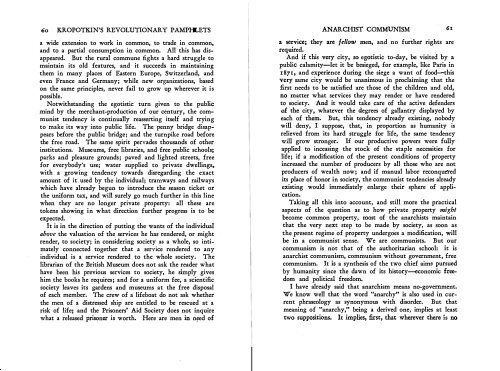Kropotkin's Revolutionary Pamphlets - Libcom
Kropotkin's Revolutionary Pamphlets - Libcom
Kropotkin's Revolutionary Pamphlets - Libcom
Create successful ePaper yourself
Turn your PDF publications into a flip-book with our unique Google optimized e-Paper software.
60 KROPOTKIN'S REVOLUTIONARY PAMPHLETS<br />
a wide extension to work in common, to trade in common,<br />
and to a partial consumption in common.<br />
All this has disappeared.<br />
But the rural commune fights a hard struggle to<br />
maintain its old features, and it succeeds in maintaining<br />
them in many places of Eastern Europe, Switzerland, and<br />
even France and Germany; while new organizations, based<br />
on the same principles, never fail to grow up wherever it is<br />
possible.<br />
Notwithstanding the egotistic turn given to the public<br />
mind by the merchant-production of our century, the communist<br />
tendency is continually reasserting itself and trying<br />
to make its way into public life.<br />
The penny bridge disappears<br />
before the public bridge; and the turnpike road before<br />
the free road.<br />
institutions.<br />
The same spirit pervades thousands of other<br />
Museums, free libraries, and free public schools;<br />
parks and pleasure grounds ; paved and lighted streets, free<br />
for everybody's use; water supplied to private dwellings,.<br />
with a growing tendency towards disregarding the exact<br />
amount of it used by the individual; tramways and railways<br />
which have already begun to introduce the season ticket or<br />
the uniform tax, and will surely go much further in this line<br />
when they are no longer private property:<br />
all these are<br />
tokens showing in what direction further progress is to be<br />
expected.<br />
It is in the direction of putting the wants of the individual<br />
above the valuation of the services he has rendered, or might<br />
render, to society; in considering society as a whole, so intimately<br />
connected together that a service rendered to any<br />
individual is a service rendered to the whole society.<br />
The<br />
librarian of the British Museum does not ask the reader what<br />
have been his previous services to society, he simply gives<br />
him the books he requires ; and for a uniform fee, a scientific<br />
society leaves its gardens and museums at the free disposal<br />
of each member. The crew of a lifeboat do not ask whether<br />
the men of a distressed ship are entitled to be rescued at a<br />
risk of life; and the Prisoners' Aid Society does not inquire<br />
what a released prisoner is worth. Here · are men in ned of<br />
ANARCHISi COMMUNISM 61<br />
a service; they are fcllQW men, and no further rights are<br />
required.<br />
And if this very city, so egotistic to-day, be visited by a<br />
public calamity-let it be besieged, for example, like Paris in<br />
1871, and experience during the siege a want of food-this<br />
very same city would be unanimous in proclaiming that the<br />
first needs to be satisfied are those of the children and old,<br />
no matter what services they may render or have rendered<br />
to society. And it would take care of the active defenders<br />
of the city, whatever the degrees of gallantry displayed by<br />
each of them. But, this tendency already existing, nobody<br />
will deny, I suppose, that, in proportion as humanity is<br />
relieved from its hard struggle for life, the same tendency<br />
will grow stronger. If our productive powers were fully<br />
applied to inceasing the stock of the staple necessities for<br />
life; if a modification of the present conditions of property<br />
increased the number of producers by all those who are not<br />
producers of wealth now; and if manual labor reconquered<br />
its place of honor in society, the communist tendencies already<br />
existing would immediately enlarge their sphere of application.<br />
Taking all this into account, and still more the practical<br />
aspects of the question as to how private property might<br />
become common property, most of the anarchists maintain<br />
that the very next step to be made by society, as soon as<br />
the present regime of property undergoes a modification, will<br />
be in a communist sense. We are communists. But our<br />
communism is not that of the authoritarian school: it is<br />
anarchist communism, communism without government, free<br />
communism.<br />
It is a synthesis of the two chief aims pursued<br />
by humanity since the dawn of its history--economic freedom<br />
and political freedom.<br />
I have already said that anarchism means no-government.<br />
We know well that the word «anarchy" is also used in current<br />
phraseology as synonymous with disorder.<br />
But that<br />
meaning of "anarchy," being a derived one, implies at least<br />
two suppositions.<br />
It implies, first, that wherever there is no

















